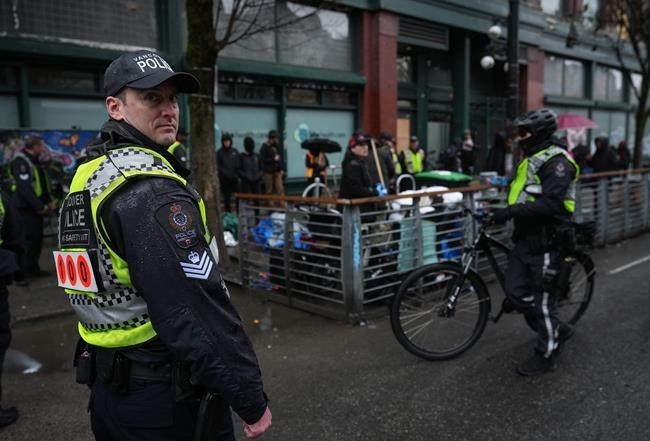VANCOUVER — British Columbia's Human Rights Commissioner has launched an inquiry into police restrictions on media covering the dismantling of a homeless camp in Vancouver's Downtown Eastside in April.
Kasari Govender said in a news release on Tuesday that reports of Vancouver police denying access to some journalists at the scene "raise serious red flags and merit investigation."
Govender said it is crucial for media to be able to gather information on possible human rights violations when police are conducting operations where they may come into contact with marginalized people.
“The sa╣·╝╩┤½├Į public rely on the media to gather and publish information, including on any potential human rights violations," Govender said in a statement. "The press plays a key role in our democracy and the protection of human rights.”
Govender said there were "multiple reports" of journalists not having access to parts of the Downtown Eastside where police and city crew operations were pulling down tents and discarding campers' belongings.
Reporters for The Canadian Press covering the event in April were initially denied access to part of East Hastings Street where tent removal was conducted behind traffic barricades and officers had secured the site.
The reporters were eventually allowed entry after one journalist challenged the access denial and escalated the issue to a police supervisor who was on-site.
A letter sent by Clayton Pecknold, sa╣·╝╩┤½├Į's police complaint commissioner, to the Vancouver Police Board said a complaint received in April noted that "preventing journalists from entering the site … was an infringement upon journalistic freedom and freedom of the press."
At a Nov. 23 Vancouver Police Board meeting recorded on video, Vancouver police Supt. Don Chapman said "no exclusion zone was ever implemented."
Chapman called the area behind barriers a "safety area" serving a public-safety purpose, while various activities were happening in the neighbourhood.
"There were numerous, as you may have watched on TV, large vehicles — garbage trucks, moving trucks — moving back and forth," Chapman said. "There was an active protest that was actually happening at the time. So, any areas … where the media wasn't getting unfettered access was done purely for safety reasons."
Chapman also said police put up no visual barriers to prevent people from seeing the tent-removal process.
"It was never our intention not (to) let people see what was transpiring," he told the meeting.
In a written statement, Vancouver police spokesman Steve Addison said media restrictions were limited "primarily during the first hour of deployment" on April 5, the day of the dismantling of the camp.
"During those brief restrictions, media and members of the public continued to have clear sightlines toward the work taking place," Addison said. "Once safety concerns were addressed, we immediately took steps to facilitate full and unfettered media access throughout the encampment zone."
He said police accommodation of media access was reflected in the extensive reporting from the zone, and Vancouver police "took proactive measures to ensure there would always be robust media access," such as inviting a television pool camera and setting up staging areas.
Vancouver Mayor Ken Sim said previously that tent removals were ordered due to warnings from police and fire of rising crime and fire risk.
At its peak, there were about 180 tents and other structures along East Hastings Street.
Sim said in a statement that Govender's work to ensure the rights of marginalized communities and uphold press freedom are "critically important to our society, and we will comply with the commissioner's inquest."
Govender's statement said the police board's dismissal of the complaint was specific to the use of media exclusion zones, and her inquiry "will look at the issue more broadly."
"This case highlights a lack of transparency about what happened in April 2023 and raises questions about the source of police authority to restrict media access in sa╣·╝╩┤½├Į and the effect that restriction or exclusion might have on human rights," a statement on the inquiry's website said.
"Shining a light on these issues will help the commissioner determine where recommendations can be made to prevent human rights violations and maximize freedom of the press to safely gather needed information."
This report by The Canadian Press was first published Dec. 12, 2023.
Chuck Chiang, The Canadian Press



